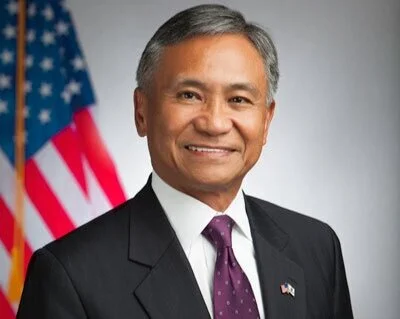Season 1: Episode 7
Duty & Debt to Country
Transcript
VOX POP BEGINS
Debt always brings up negative feelings for me. f I define it as you owe somebody or some institution.
It’s something that is, you know, just being what you owed or owing someone else, it's something that you need to pay back to someone or something.
And when you don't, there's consequences most of the time.
For utang, I never thought that would be perpetuity.
When you include blood in there or I might tie to you forever and ever and ever. But I don't think it was meant to be that way.
VOX POP ENDS
INTRODUCTION BEGINS
In Blood Debts, we tell the stories of choices and sacrifices to pay back what is owed and pay forward something of value.
I’m your host, Leezel Tanglao.
On this podcast, we talk about one of the few through lines in people’s lives - debt.
You’ll hear stories from the Filipino diaspora around how debt has impacted all aspects of life from those in the medical field, public service sector to creative arts.
As a journalist, I’ve spent more than a decade reporting on the financial aspects of debt in diverse communities.
But many carry debts beyond money.
I always like to look at it from the standpoint of a debt of appreciation or gratitude. Be successful, like my parents or the soldiers and families of making me successful as a military officer. Or gratitude for people like the veterans who during World War II made our lives more prosperous today or just in general, people have helped me along the way. Or looking at it from the standpoint of paying it forward.
In this episode, we talk to retired General Major Antonio Taguba. we discuss duty and debt to country along with how to pay those debts forward.
INTRODUCTION ENDS
RETIRED MAJOR GENERAL ANTONIO TAGUBA:
My name is Antonio Taguba, retired Major General United States Army. I'm the chairman of the Filipino Veterans Recognition and Education Project, or commonly known as FilVetRep.
A lot of people, my parents, my siblings, those of us who have served honorably and those I have served with as a matter of a life. A large value that they're going to get for the rest of our lives.
You know, our military today, it represents just a little over one half of our population, three hundred and thirty million, we have maybe one and a half to two million serving today, but if you include, the families will also serve. I mean, you're talking about three to five million. So I look at it as a country indebted to those who serve in one hundred and forty five or 130 countries today, and they're the ones that are also at the forefront also. That is our law enforcement people. We're indebted to those who serve as well.
So that's the type of debt that a debt of gratitude, not necessarily blood, but a debt of gratitude, that we have people that are willing to serve our country and willing to die for…to regain our freedom, democracy. That's how we see our military today. That's how I saw or at least experience with my dad and my mother in the past.
So in terms of military service, we have people who pay it forward by continuing to serve. Our country. For generations, I have a son in the military. Not that I might ask them to serve, but I have experience with our tradition of service in our family, have a message that there are lots of friends who are still serving today so that get that status, not just for them selves or others, is that that is to our country or someone that we care about. So we repay that debt by continuing to serve our country.
LEEZEL TANGLAO: And what does it mean to be indebted to our families and dealing with those who are culturally bankrupt?
We know we're always going to be good to our families, our partners, right. But they don't have to repeat it over time because all we want, all my parents wanted was to be good citizens, not get in trouble. This paying it forward or so that being indebted to them over some people. Or traditionally a culturally bankrupt. They'll keep reminding that, which means that they've got to be tethered to that debt and they will create more problems emotionally and professionally and personally, that they're not gonna be able to get all of their life. And that's unfair to them.
When I have sessions with millennials, jeez, I live at home and my mom would always say, oh, my dad would always say, I want you to do this. I want you to do that. But if you are successful, be a doctor or what if you're unsuccessful, being an engineer or a lawyer? Well, we'll hold that against you. They ought not to do that. Now it's called being imprisoned culturally. So is that considered a debt? It could be. I presume that way…you use that term loosely of having to satisfy your parents or satisfy satisfied anyone for that matter.
We are here in the United States for one reason….to live a life of freedom, to be able to decide what we want to be in life, and if we get in trouble, somebody will bail out, hopefully. If not, we are not here in life to fail.
We are in this to succeed. And in order to succeed, people will help us along the way, and you repay them in some form or fashion, but then you also pay it forward.
If we are in combat and war. I would not consider that as a blood per say, but they said that your country protecting the citizens and probably the rule of rule of law, a lot warfare because there's laws of warfare as well. My perspective is despite all that. Not to be using that term. We're obviously into something.
But it doesn't have to be considered as a blood death, it could be considered as a debt of gratitude. It could be a debt of appreciation.
It's a moral obligation to pay it forward, to contribute, to be good citizens, and that's how we pay a repay a debt of citizenship…So we will pay it forward.
OUTRO BEGINS
There are many sides to debt.
This series intends to take you on a journey through defining and redefining debt through stories of Filipinos in the diaspora.
Upcoming stories from guests like rapper Ruby Ibarra are just a sampling of the journeys you’ll hear along the way.
That’s all for this episode, thank you for listening.
To find out more about the series and upcoming episodes and resources, visit Blooddebts.com
Follow us on Facebook, Twitter and Instagram.
Blood Debts is produced and hosted by me Leezel Tanglao.
This series is a legacy project of the Filipino Young Leaders Program.
Shoutout to FYLPRO Batch 8.
This series is dedicated to all those who struggle to talk about uncomfortable issues and for all those who ever felt overlooked.
I see you.
I hear you.
OUTRO ENDS

